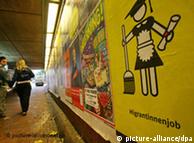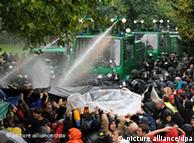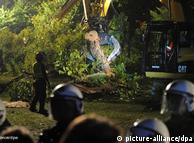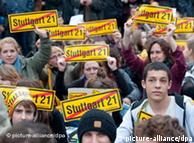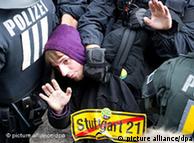
“La germanofobia existe en los patios de nuestros colegios y en las vías de nuestras estaciones de tren: en esos sitios, los niños son agredidos verbalmente por el hecho de ser alemanes”, declaraba hace unos días Kristina Schröder, la ministra germana de Familia, en una entrevista concedida a la cadena de televisión pública ARD. “Patata” o “guarra alemana” son, según la política cristianodemócrata, algunos de los insultos a los que los menores se ven expuestos en los descansos escolares o de camino a casa.
Es una “etnia” concreta contra la que se procede, dijo la ministra. Por lo tanto, puede hablarse de xenofobia. De pronto, un debate que siempre se libró en la dirección contraria, percibido como la marginación de los extranjeros por parte de los nativos, recibe un cambio de sentido. Los alemanes están siendo “discriminados en su propio país”, advirtió Schröder.
Fue un estudio del sindicato de profesores el que puso los controvertidos datos sobre la mesa. “Tenemos que tomarnos en serio los informes que llegan desde los colegios: al parecer, los casos en los que alumnos y maestros que se ven confrontados con comentarios germanófobos han dejado de constituir una excepción”, añadió Maria Böhmer, encargada de temas migratorios del Gobierno alemán.
Son varias escuelas germanas en las que los alemanes de origen representan la minoría. Éstas se sitúan sobre todo en barrios marginales con un alto porcentaje de población foránea que son, en muchas ocasiones, un ejemplo de política de integración fracasada.
Un tema aún candente
Después de negar durante años que Alemania fuera un Estado receptor de inmigrantes, en la última década la política germana ha emprendido la ardua tarea de recuperar el tiempo perdido y tomar medidas destinadas a integrar a los inmigrantes residentes en el país, algunos desde hace más de dos generaciones. Muchos son los avances logrados, pero la cuestión continúa siendo candente y estando dotada de altas dosis de emocionalidad.
El uso del tema con motivaciones meramente políticas, como cuando hace unos meses el político cristianodemócrata alemán Peter Trapp y su colega de la Unión Cristianosocial Markus Ferber exigieron que se sometiera a tests de inteligencia a los que quisieran emigrar a Alemania; o como la campaña electoral llevada a cabo en 2007 por Roland Koch, entonces primer ministro del Estado federal de Hesse, en la que pedía la rápida expatriación de los jóvenes extranjeros que cometieran delitos graves, no han contribuido a calmar los ánimos. Tampoco lo ha hecho el reciente revuelo en torno a un libro escrito por Thilo Sarrazin, hoy ex directivo del Bundesbank, el banco central alemán, quien advertía de un mañana lleno de mujeres que se cubren la cabeza con el pañuelo musulmán.
El debate se desata de nuevo, pero en esta ocasión al contrario. Entender el germanofobia como una insignificante pelea entre niños de colegio sería “incorrecto y peligroso”, opinó Heinz-Peter Meidinger, director de la Asociación Alemana de Filólogos. “En Alemania, los diferentes grupos migratorios están cada vez más segregados, la conversión en guetos de barrios completos aumenta y, en consecuencia, crece la conversión en guetos de las escuelas”, indicó Meidinger. “Todo el que conoce este ámbito sabe que los insultos contra los alemanes existen”, comentó por su parte Volker Bouffier, el actual primer ministro de Hesse.
“No debe ser un tabú”
Ningún tema relacionado con el racismo debe ser un tabú, tampoco cuándo éste se dirige contra la población mayoritaria, insistió Bouffier. “Muchos ciudadanos tienen la sensación de que la clase política no se ocupa de las cuestiones que más les conciernen. Si a esto se le suma la dominancia de lo políticamente correcto, el resultado es que se va forjando una reacción a la actual situación que puede llegar a ser explosiva”, dijo el primer ministro.
“Siempre que se someta a acoso a niños, independientemente de la nacionalidad que sean, hay que actuar decididamente en contra”, constató Ludwig Spaenle, de la Unión Cristianosocial, en unas declaraciones hechas al magazín alemán Focus.
